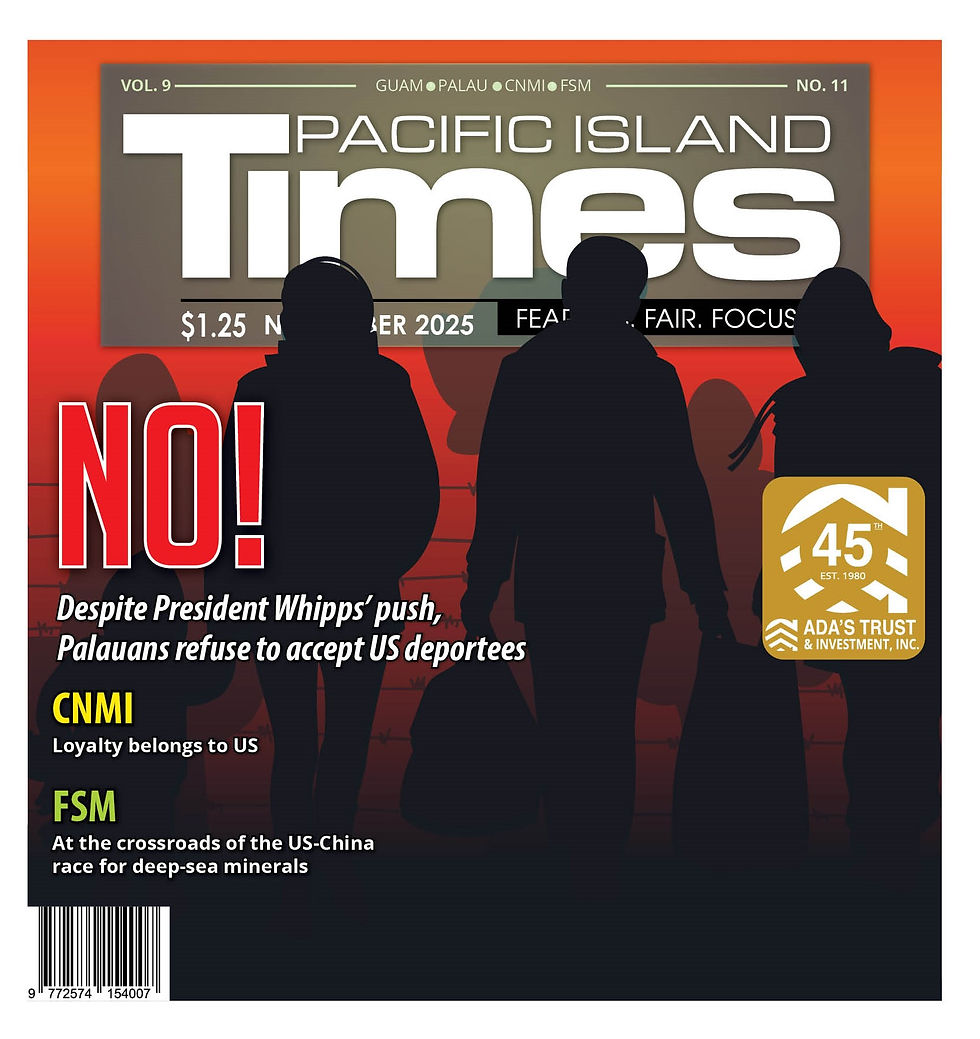Guam National Guard nearly placed under receivership due to leadership gap, former adjutant general says
- Admin

- Nov 17, 2025
- 3 min read
Updated: Nov 19, 2025

By Mar-Vic Cagurangan
The Guam National Guard risks losing federal trust due to leadership instability, the former adjutant general has warned Gov. Lou Leon Guerrero, noting that the organization narrowly dodged receivership for the same reason two years ago.
The day before he relinquished his post at the GUNG on Friday, Dr. Michael Cruz sent a memo to the governor, documenting “significant concerns regarding the process by which the transition of the position of adjutant general is being conducted.”

Cruz said the “procedural irregularities” that marred leadership succession have exposed GUNG to “tangible
risks,” such as “ambiguity in command authority” and “potential erosion of federal trust, particularly given the
prior TAG investigation.”
The GUNG faced a receivership threat in 2023 due to a leadership void created by the governor’s failure to promptly name a replacement for Maj. Gen. Esther Aguigui, who faced an administrative investigation while in office.
According to Cruz’s Nov. 13 memo, National Guard Bureau chief Daniel Hokanson and legal counsel Charles Young met with the governor in May 2022 and recommended a replacement for Aguigui.
“Unbeknownst to me at the time, a two-year investigation by the Office of
Complex Administrative Investigations concluded with 25 substantiated violations against the then-(adjutant general),” Cruz stated in a memo to Leon Guerrero, the Guam Guard’s commander-in-chief.
In December 2022, Aguigui announced her intent to retire.
“After extended delays, I was informed by Charles Young in March 2023 that
due to the delay in the replacement of my predecessor, the GUNG could either be placed under the receivership of another State or face losing its federal recognition,” Cruz said.
Cruz, who has served the U.S. Army since September 1987, was then the president and CEO of the Guam Regional Medical City and the state surgeon leading Guam’s Covid-19 response.
Read related stories

On March 1, 2023, the governor announced Cruz’s appointment as the new adjutant general, prompting him to leave his hospital position “given this urgent federal concern” and the need to “safeguard the GUNG’s credibility, stabilize the organization and preserve federal trust.”
Last week, however, Cruz was abruptly replaced as GUNG’s adjutant general in the same manner in which he was abruptly installed into the post in 2023.
The governor appointed retired colonel Karin Watson as the new adjutant general on Oct. 13, without notifying Cruz, who was not set to retire until Sept. 30. 2026.
While he eventually learned—through the leaked appointment letter—that a successor had been selected, Cruz said he was never notified of the effective transition date. On Nov. 12, the governor’s office advised him that Watson was to begin her tenure on Nov. 17.
“I fully acknowledge and respect your authority to appoint (the adjustant general)," Cruz told the governor. "My concern lies solely with the procedural
manner in which the transition has been executed—an approach that diverges from established military, administrative, and federal norms and introduces avoidable risk to the Guam National Guard."
Cruz questioned the legality of the governor’s move to fill a position that he said was not officially vacant.
“Although I submitted a letter of intent to retire effective Sept. 30, 2026,
I have not resigned, been relieved of command, been suspended, been terminated, been formally removed under any statutory or administrative
process, or received any written or verbal notification altering my status,” Cruz stated in the memo.
He recalled that an Oct. 29 memo from the governor’s chief of staff indicated that there was no change in his official status “and that all operational matters shall remain status quo until further notice.”
“Therefore, no lawful vacancy exists for a successor to fill,” he said.
Watson was sworn into office today as the new adjutant general.
“My concern is not the decision to appoint a successor. It is the procedural
irregularities in how the transition has been executed,” Cruz wrote. “This process conflicts with Army, NGB, and standard military leadership transition norms, and creates unnecessary ambiguity in command authority.”
Cruz warned that unstable leadership at GUNG could create confusion,
affect joint operations with Indo-Pacific Command and disrupt State
Partnership Program engagements with the Philippines, Palau and the Marshall Islands."
Subscribe to
our monthly
digital edition






